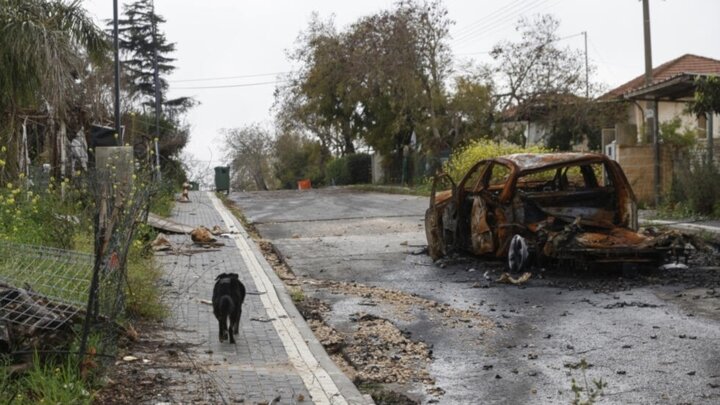Hard scenarios of Zionists against Hezbollah according to Haaretz

report Mehr News Agency quoted by Al-Mayadin, “Chuck Frielish”, the former deputy internal security adviser of the Zionist regime, by publishing an article in the Hebrew newspaper Ha’aretz, about the major dangers that Tel Aviv faces in the event of a large-scale war with Lebanon. will be exposed to it, pointed out and emphasized: this war can lead to a big multi-front war.
This former Zionist official wrote in his article: The ability of Hamas to resist the massive attack of Tel Aviv, along with the deterioration of Israel’s strategic situation, has strengthened the self-confidence of the resistance and Most likely, it has increased its willingness to bear more risks.
The author of this article went on to point out the main options that the Zionist regime faces against Hezbollah, which is as follows: continuing the current path, fire Enough unilateralism, coercive diplomacy, diplomatic initiative, conducting a limited operation, conducting a large operation.
According to this article, each of these options should be carefully considered and their implications researched. But the most important question is whether any of these options can lead to an improvement in the strategic position of the Zionist regime, or whether this regime will pay a heavy price and eventually return to square one.
6 difficult options for the Zionists against Hezbollah
The mentioned former Zionist official emphasized about the first option, i.e. continuing the current path, that until now both Israel and Hezbollah have wanted to continue the conflicts in the current form. In the meantime, the damages caused to the cities, villages and facilities of the northern settlements are significant, and about 60,000 residents of these settlements have evacuated their homes for more than 8 months and cannot return there. [We should point out that according to the reports of the Zionist and American media, the number of refugees in the north of occupied Palestine has exceeded 250,000 people.]
He continued that following the Al-Aqsa storm operation, the public opinion of the Zionist regime is extremely afraid of an unlimited war. Since the balance of terror has been with Hezbollah since 2006, there is a possibility that the situation will continue in this way.
The author of this article about the second option, i.e. a unilateral ceasefire, adds: This option will be implemented if the hope of isolating Hezbollah and forcing it to fire It is enough to obtain international legitimacy for Tel Aviv to carry out military operations if necessary. But the announcement of a ceasefire by the cabinet will be a sign of its weakness, and its implementation is politically very difficult, especially during the Gaza war.
According to this article, regarding the third option, i.e. coercive diplomacy, after the unilateral ceasefire from Tel Aviv, this regime asks Hezbollah to stop its attacks within a certain period of time. to stop Otherwise, Tel Aviv will resume its military operations. This option may be able to create international legitimacy for the army, but it is likely that Hezbollah and the Axis of Resistance will reject this option. Therefore, Tel Aviv will lose the element of surprise and the risk of a widespread war will increase.
According to the former deputy of the internal security adviser of the Zionist regime, the fourth option, the diplomatic initiative, is the best option, but there is a high probability of reaching a diplomatic agreement and maintaining it for a long time. There is no stopping the conflicts with Hezbollah. Also, this option requires the Zionist regime to grant territorial concessions to this country along the border with Lebanon.
The author of this article stated about the fifth option, the limited operation, that its purpose is to restore the deterrent power of the occupying regime and force Hezbollah to accept a ceasefire and withdraw from It is the borders so that the residents of occupied northern Palestine can return to their places of residence. Meanwhile, there is no guarantee that conflicts will remain limited or that Tel Aviv will be able to achieve its military goals. We should also note that all periods of limited war with Hezbollah since the 1990s have ended disappointingly for the Zionist regime, and the settlers are tired of repeated promises to improve the situation through limited operations.
Freilish noted about the sixth option, which is related to a large operation: the purpose of this option will be to make a fundamental change in the situation; But such an option is associated with many risks and could lead to a major regional war; A war in which Tel Aviv’s internal front and military power will be severely affected, so that the Gaza war will be very pale in comparison to this regional war, while Tel Aviv has not yet achieved its goals in Gaza.
In the rest of this article it is emphasized: such a war will turn the anti-Israel sentiments in America and around the world into a storm. In addition, many conclude that these behaviors of Tel Aviv are caused by Prime Minister Benjamin Netanyahu’s need to continue fighting in order to stay in power and postpone early elections. This issue makes the effective management of the war more difficult, especially in the shadow of Tel Aviv’s internal crisis.
At the end, the author of this article emphasized the failure of the Zionist regime in preventing the increase of Hezbollah’s power and stated: Maybe postponing the war with Hezbollah is one of the best options. be So the settlers have to live with the present reality and this is a painful result for the northerners who have to choose between returning to their homes in the north under constant threat, or moving from there forever.


